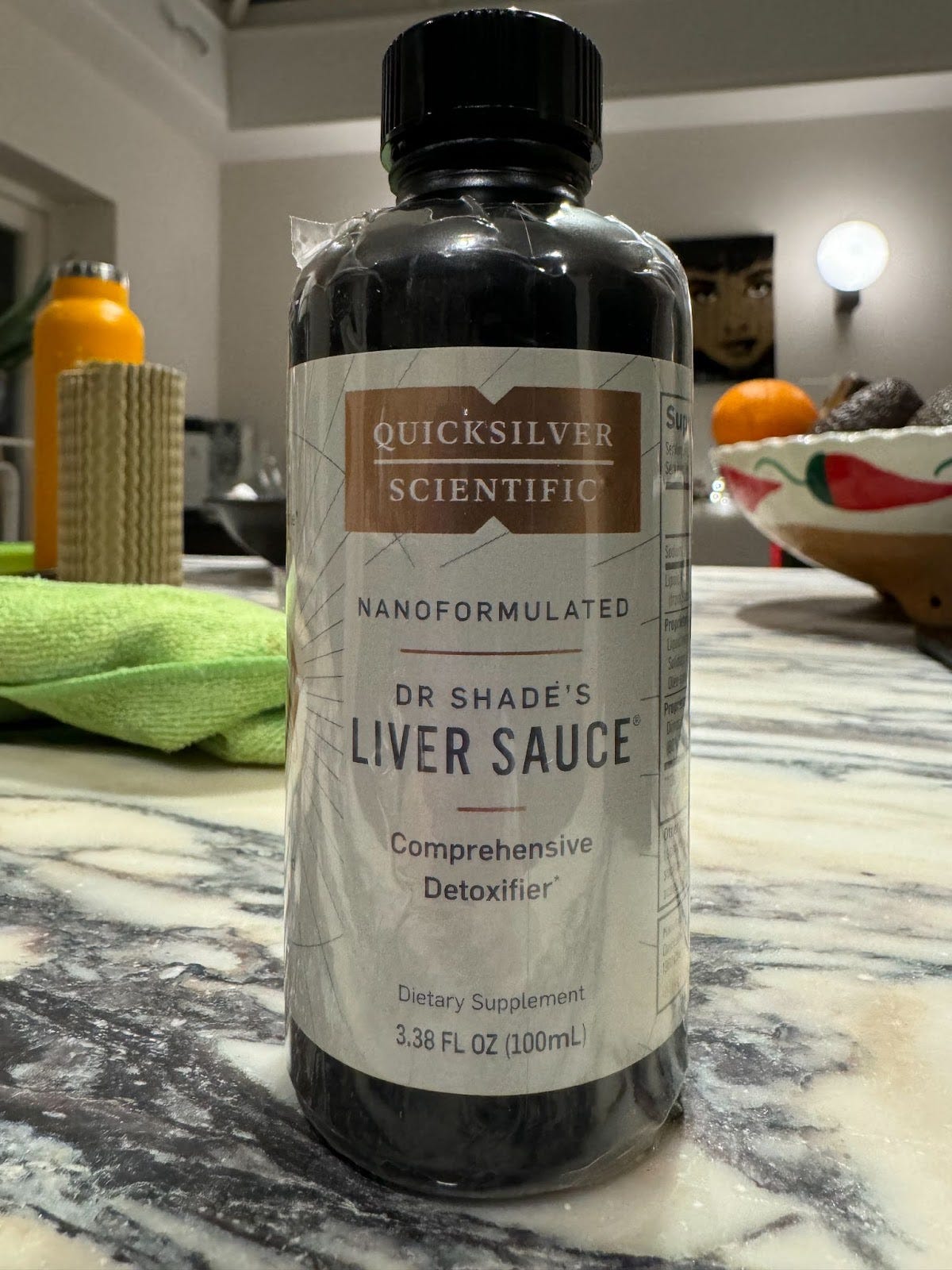Brain fog like I've never experienced
E54 The 12 practices I use to keep my brain functioning optimally
This week's newsletter has been one of my hardest to write.
As I was reading through my notes, I found myself reading the same sentence over and over. Nothing sank in. I couldn't uncover the story that I wanted to tell.
That's writer's block, you might say!
Well, on Monday morning, I discovered that I could barely think straight. I would start a sentence and find myself losing my train of thought. I had a dull, pervasive heaviness in my head and felt listless and lacking in any motivation to do anything much at all.
My brain was so foggy it felt like I had just got off a 13-hour flight to Singapore having had no sleep and needing to go straight into a meeting.
It has been the opposite of effortless.
The last time I had brain fog this badly was before I adopted a paleo-template approach to what I eat. That single change to eating as much as possible of nutrient-dense, whole, low-inflammatory foods was a game changer. The only times I've had brain fog since have been the mornings after a big night out!
Not only was my brain foggy, but I've also had a low-grade headache since Monday, and my gut has been keeping me up at night as you can see from my Oura ring scores. (I'm usually in the 85+ (out of 100 range) for readiness and sleep).
If you caught last week's newsletter, you might already have guessed why I'm feeling like this.
On Monday I started a 4-week detoxification protocol. For the first hour each morning, I am doing this 👇
Take 1 tsp of "liver sauce" after waking.
Wait 30 minutes.
Take a sachet of binder mixed in water.
Carry on my day as normal.
The detox is designed to take out the Ochratoxin A (a toxic mould commonly found in water-damaged buildings) and the toxic heavy metals - arsenic, lead, mercury and silver - that have been hiding in my body for ... well, I don't actually know how long.
Brain fog, gut disturbances and listlessness are symptoms of a Herxheimer reaction - the adverse response of the body to toxins. It's a normal occurrence when a protocol works to loosen the "bonds" that the toxins have formed so they stick around in the body. As these toxins are liberated they circulate around causing this reaction until the binder helps to expel them.
Thankfully, each day is getting easier.
Optimising the most important organ in our body
Have you ever experienced brain fog? Do you wake up feeling groggy and wonder why the grogginess doesn't go away? Do you find it hard to concentrate during the day?
Having this week's experience of brain fog after so many years reminded me of how important our brains are for everything we do.
From how we feel to our ability to be present around others.
From our ability to solve problems to talking about them.
From our ability to feel motivated to actually being productive.
So this week I wanted to share some of the things that I do to look after my brain.
Why do we get brain fog?
I'm not a medical expert, and I'm not here to diagnose the causes of your brain fog.
But what's been helpful for me has been understanding some of the potential areas that might warrant further investigation.
The good news is that there are some easy wins you can adopt to have solid foundations for a brain that's fog-free. If those don't seem to work, then it might be a moment to do some deeper investigations.
Here's a non-exhaustive list of what can cause brain fog:
Obvious ones, like lack of sleep, a cold or a hangover!
Gut issues or dysbiosis - there's a link (the gut-brain axis) between the state our gut is in and the state of our brain and how it functions.
Gluten (which might be a factor even if you're not a coeliac, but have non-coeliac gluten sensitivity),
High cortisol
Infections
Tick infections - like Lyme disease
Allergies
Environmental toxins
Autoimmune conditions
What I do to have an optimally functioning brain
You probably have a good idea of what can support your brain health. Perhaps you already have a regime in place.
I’ve listed below my "go-to" practices that I use as the foundations for a brain that functions optimally and allows me to feel good.
I’ve grouped them into two sections - preventative and maintenance/optimisation.
It's not by any means a complete list, and it's not something that you have to adopt! There are a lot of practices here which I've incorporated into my daily routine over time.
Perhaps there's one that really stands out to you that's unusual, or you're curious about.
ps If you’re an entrepreneur, a lawyer or another high-flying professional - who’s looking to bring joy back into your work and home life - by building a healthy brain for a career that’s full of success in a way that feels effortless, get in touch and let’s have a conversation.
Over to you
I'd love to hear about the ones you use already or ones that I've missed that work for you!
And if you have any questions about any of them, please ask me!
Step 1: Steer clear of environmental toxins
First up is minimising and eliminating the sources of environmental toxins, like the ones I'm now trying to remove from my body that can lead to poor brain (and overall) health. This is an area where prevention is definitely better and easier than the cure!
Swapping toxic personal products for safe ones that don't disrupt our hormones.
Ventilating at home. It's especially important in winter when our homes seal in off-gassing that comes from the paint on our walls, the foam from fire retardant foam furniture, from the carpets we line our floors with. The best approach is to choose safe products in the first place, but ventilation is the next best thing.
Removing the sources of mould/mildew and using a HEPA air filter, especially if you live in humid climates or a water-damaged building. If you want to test your home, this is a place you can try in the UK. It's important not to use bleach or similar products to clear mould. It simply spreads the mould spores around. If the company you choose for any remedial work suggests this, it's one to avoid!
Where possible eat organic to avoid pesticides, like glyphosate, and antibiotics, all of which can disrupt our gut microbiome. Or if you aren't able to source organic, making better choices when choosing what non-organic foods you're eating to minimise you're exposure. The EWG and Pesticide Action Network have good resources
Drinking filtered/purified water.
Sweating: sweating is one of the pathways that our body uses to remove toxins (in addition to the kidney, liver and gut). Sweating through exercise or saunas helps this process.
Step 2: Optimisation + Maintenance
Next up are the other ongoing practices I have to keep my brain functioning optimally every day.
Movement: Getting out of my chair and standing as much as possible is so important. Sometimes I use my standing desk. A study from UCLA found that participants who sat for too long experienced thinning in the regions of the brain that are involved in memory formation.
Mindfulness and meditation: I've been working more on being mindful this week. When I've noticed my headache or my gut grumbling, I've paid attention to my breath, the sensations I've noticed in my body, noticing how I'm feeling - without judgement or trying to fix it. When I've not been experiencing brain fog, mindfulness and meditation are rewiring my brain to be calmer and maintain a greater sense of equanimity and presence.
Improving my gut health: I've shared it before, but this paleo-template approach is one I follow daily as closely as I can. Because it highlights three different groups of food (eat liberally, eat in moderation, avoid), it's a really handy set of principles that you can apply anywhere, anytime.
Taking regular breaks: When I was up against tight deadlines, I would always push through to the deadline. But I'd reach the end of a day and my brain would feel like it had been fried in some seed oils! Nowadays, I set a Pomodoro timer using the TimeOut app that reminds me to get up and take a 5-minute break after 25-minutes of work. Every two hours, it reminds me to take a longer break to help prepare for the next period of deep work.
Cold showers: I'm always amazed by how our mitochondria respond to stressors, like cold showers. Cold exposure activates brown adipose tissue, which improves the functioning of our mitochondria and metabolism. My cold showers - especially during the winter months - not only promote autophagy, a process that recycles the old and damaged cell parts, but they leave me feeling Fasting has similar effects.
That’s it for this week!
As always, I appreciate your feedback on Effortless Thursdays.
If Effortless Thursdays resonated with you, I'd be grateful if you told just one friend to subscribe. They and you can always unsubscribe using the link below.
What did you think of this week’s edition? How can I make it more useful to you? Let me know in the comments, by email, on Twitter or on LinkedIn.
To your health and success!
Eric












Thss suonds horrrble. Thnk Gud I not never especienced frain bog. Evrythng funkzioning [purfekhtly ovur here. But gld to no what i kin doo jst in caze I kneed to detux.
I almost skipped your newsletter this week as I have the reverse problem: too much to stuff into one edition.
But I'm glad I didn't. I'm sending this one to all my loved ones esp my children. It's loaded with stuff I already knew. But distilled down and connected perfectly. Hope you are feeling the positive effects of your detox!